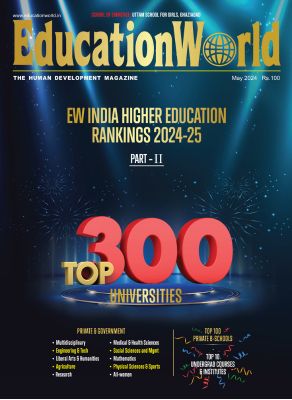India’s G-20 presidency must be understood not only as a resounding geo-political success, but also a model for achieving important educational goals and life skills
 Dr. (Mrs.) Amita Chauhan
Dr. (Mrs.) Amita Chauhan
Chairperson, Amity Group of Schools and RBEF
Afterthe unprecedented success of our lunar mission, Chandrayaan-3, which placed our country firmly amongst the most advanced nations in the geo- political arena, the recent G20 Summit held in New Delhi has come like the proverbial icing on the cake. The ’soney ki chidiya’ is back and ready to lead the world into a bright and prosperous future. I also believe that the younger generation can learn several lessons from this historic achievement, both at an individual level and for the larger good of society.
Being Inclusive
The theme of G-2—0 ‘One Earth, One Family, One Future—’ has been derived from India’s Vedic philosophy of Vasudhaiva Kutumbakam. This Sanskrit phrase finds mention in the Maha Upanishad and the Rig Veda, and reflects the all-encompassing vision of our ancestors who espoused that the entire world is one family. By adding a futuristic tenor to this ancient thought, India has taken leadership in creating a world where all living beings can co-exist harmoniously, with mutual co-operation. This idea of inclusivity was exemplified when the African Union was made a permanent member of G-20. The continent has suffered from slavery, war and poverty since long and is now striving to meet the pace of development in rest of the world. India, by hand- holding its continental neighbour, has facilitated its access to knowledge, resources, trade partnerships etc., setting a precedent for the world to follow.
Further, the acceptance of New Delhi Declaration, which enlists the guidelines for cooperation and synergy between all nations for a peaceful world, is testament to the fact that India’s vision of Vasudhaiva Kutumbakam is acknowledged by all. In a world rife with war and territorial conflicts, values of respect and empathy are the need of the hour. These examples can be discussed in classrooms to inculcate the understanding of India’s ancient wisdom and its relevance in the 21st century.
Going Green
(Earth is my mother and am her child Atharvaveda (12.1.12))
Vedas have taught us that worshipping nature and all its bounty on Earth is the prime responsibility ofyeeva (human being). Every element of nature – be it rain, wind, fire, trees, river—s is worshipped in our country since time immemorial. That this bhaav (feeling) continues to be an intrinsic part of Indian milieu was proven during the G-20 proceedings. The G20 logo itself juxtaposes planet Earth with the lotus, India’s national flower that reflects growth amid challenges. The Earth reflects India’s pro-planet approach to life, one in perfect harmony with nature. In addition, a pathbreaking treaty was made between India and the Middle-East for the export of green hydrogen and biofuel by India to the Middle-East.
All other member nations also committed towards adopting sustainable energy resources to create a greener planet.
When we teach children about environment through these examples, it will motivate them to ideate and innovate towards creating sustainable energy solutions for a greener planet.
Striving for Excellence
India had never hosted anything of the scale of the G20 Summit. Naturally, there was some initial scepticism whether India was ready to host an international event of this stature. India, however, has passed the test with flying colours. It took a lot of perseverance, passion and resilience
on part of the Indian government and bureaucracy to achieve this mammoth task. From the moment dignitaries alighted from their planes till the time they bid adieu, every gesture of our country has embodied the spirit of Atithi Devo Bhav. Even the international press took notice when we served millets, the healthier and more environment- friendly grain, as the main ingredient during meals. It’s a great lesson to be taught to children that as leaders or thinkers, they might face hurdles and criticism from various corners, but they need to believe in themselves and their mission and keep working hard till they reach their goal. This age-old Sanskrit shloka must be reinforced in their minds as a way of a scholar’s life:
(Any work is accomplished by hard work, not just by thinking. In the same way, as the deer does not enter the mouth of the sleeping lion)
Indeed, the G20 Summit has yielded significant outcomes across economic, financial, technological, and diplomatic fronts, but it has also laid out a blueprint for young minds to follow. The summit is the turning point in the history of India, as it has changed how the world perceives our country and how our children, the leaders of tomorrow, will contribute to the process of nation-building.
We welcome your views on this topic. Please email them to us at [email protected]



























